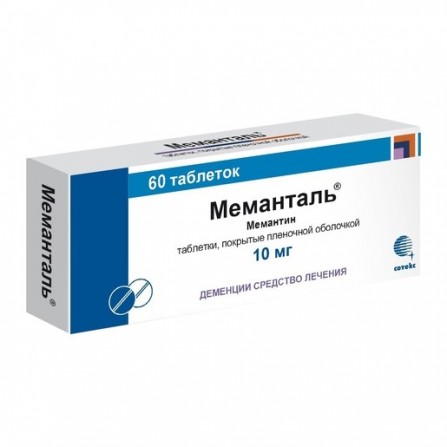Memantale film-coated pills 10 mg N60
Condition: New product
1000 Items
Rating:
Be the first to write a review!

More info
Active ingredients
Memantine
Release form
Pills
Composition
Active ingredient: Memantine (Memantinum) Active ingredient concentration (mg): 10
Pharmacological effect
Remedy for the treatment of dementia. It is a noncompetitive antagonist of glutamate NMDA receptors (including in the substantia nigra), thereby reducing the excessive stimulating effect of cortical glutamate neurons on neostriatum, which develops against the background of insufficient release of dopamine. Reducing the entry of Ca2 + into neurons reduces the possibility of their destruction. It has nootropic, cerebrovasodilating, antihypoxic and psychostimulating action. It improves impaired memory, increases the ability to concentrate, reduces fatigue and symptoms of depression, reduces spasticity of skeletal muscles caused by diseases or damage to the brain.
Indications
Dementia is moderate to severe in Alzheimer's disease.
Contraindications
Individual hypersensitivity to the drug, severe renal dysfunction (creatinine clearance (CK) less than 5-29 ml / min), severe liver failure, pregnancy, breastfeeding, children under 18 years of age (efficacy and safety not established). lactose intolerance, Lappa lactase deficiency or glucose-galactose malabsorption (the product contains lactose monohydrate).
Use during pregnancy and lactation
Contraindicated for use in pregnancy and lactation (breastfeeding).
Dosage and administration
The drug is taken orally, once a day, always at the same time, regardless of the meal. Dosing regimen set individually. It is recommended to begin treatment with the appointment of the minimum effective dose. Prescribe the drug during the 1st week of therapy (days 1-7) at a dose of 5 mg / day, during the 2nd week (days 8-14) - at a dose of 10 mg / day, during the 3rd week (days 15-21) - at a dose of 15 mg / day, during the 4th week (days 22-28) - at a dose of 20 mg / day. The maximum daily dose of 20 mg. In patients older than 65 years, as well as patients with CC 50-80 ml / min, dose adjustment is not required. For patients with moderate renal insufficiency (CK 30-49 ml / min), the daily dose is 10 mg. In the future, with good tolerability of the drug for 7 weeks, the dose can be increased to 20 mg according to the standard scheme.
Side effects
From the side of the central nervous system: often - headache, drowsiness, dizziness. rarely - confusion, hallucinations (mainly in patients with Alzheimer's disease at the stage of severe dementia), gait disturbance. very rarely - seizures. frequency not established - psychotic reactions. On the part of the digestive system: often - constipation. rarely - nausea, vomiting. frequency is not installed - pancreatitis. From the side of the cardiovascular system: rarely - arterial hypertension, venous thrombosis / thromboembolism. Other: rarely - fatigue, fungal infections. There are separate reports of the occurrence of these adverse reactions when memantine is used in clinical practice: dizziness, drowsiness, anxiety, fatigue, anxiety, increased ICP, nausea, hallucinations, headache, impaired consciousness, muscle tone, gait disturbances, depression, convulsions, psychotic reactions, suicidal thoughts, constipation, nausea, pancreatitis, candidiasis, increased blood pressure, vomiting, cystitis, increased libido, venous thrombosis, thromboembolism, allergic reactions.
special instructions
From the side of the central nervous system: often - headache, drowsiness, dizziness. rarely - confusion, hallucinations (mainly in patients with Alzheimer's disease at the stage of severe dementia), gait disturbance. very rarely - seizures. frequency not established - psychotic reactions. On the part of the digestive system: often - constipation. rarely - nausea, vomiting. frequency is not installed - pancreatitis. From the side of the cardiovascular system: rarely - arterial hypertension, venous thrombosis / thromboembolism. Other: rarely - fatigue, fungal infections. There are separate reports of the occurrence of these adverse reactions when memantine is used in clinical practice: dizziness, drowsiness, anxiety, fatigue, anxiety, increased ICP, nausea, hallucinations, headache, impaired consciousness, muscle tone, gait disturbances, depression, convulsions, psychotic reactions, suicidal thoughts, constipation, nausea, pancreatitis, candidiasis, increased blood pressure, vomiting, cystitis, increased libido, venous thrombosis, thromboembolism, allergic reactions.





